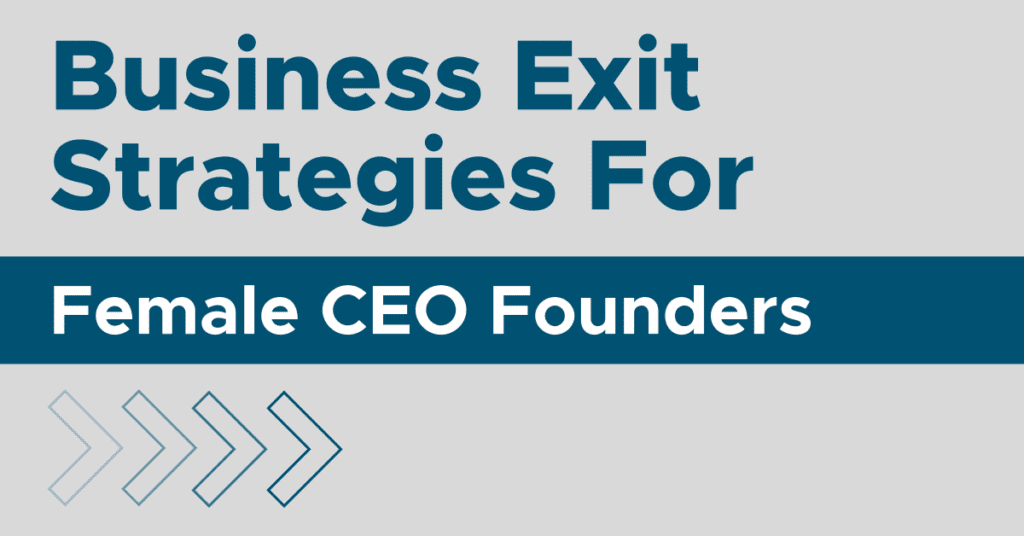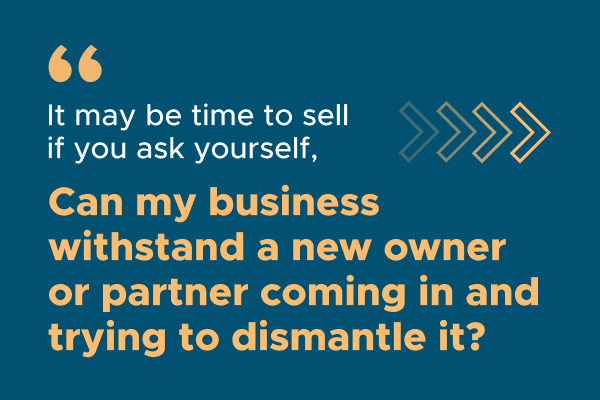Written by Barbara Young, Cresset Consultant and Former Advisory Board Member.
As an entrepreneur who has built and sold multiple businesses over my 40-year career, I can tell you that from my experience women and men often approach exiting a business very differently.
However, I find there are too many female business owners who don’t fully embrace and acknowledge this reality. That’s a mistake. How we exit our businesses is as unique and individualized as we are. What drives women to build a business – and exit a business – can look very different than for men.
That being the case, women should not feel compelled to exit businesses using the same strategies and rationale used by men. Our exit strategies and reasoning are ours and ours alone.
And we are a powerful force. According to the National Association of Women Business Owners, there are a total of 12.3 million women-owned businesses in the United States. In fact, 40 percent of businesses in the United States are women owned.
That is an enormous number of women who should feel empowered to exit their businesses on their terms.

To provide those women guidance, I recently connected with friends and fellow female entrepreneurs Brenda Snow, CEO of Snow Companies; and Kara Trott, Founder and Board Chair of Quantum Health, to explore how they planned for the transition from their businesses, as well as their advice for other women business owners who are approaching an exit.
Every successful businesswoman inevitably faces a point in her career when she must decide how and when to exit. What advice do you have for those women?
Kara: First, I didn’t build my company simply to create a job for myself. I had a really good job and was about to become partner at a law firm. I launched Quantum Health because I believed there was a problem I could help solve. My goal has always been to make sure the company had the best chance at long-term success. As soon as I felt the company was sustainable and I could replace myself, I did.
One of the primary catalysts for “replacing myself” was the death of my father. He died at 52. As I approached that age, I knew I didn’t want my entire life to be consumed by the firm. I knew there was so much more to experience. That played a huge role in my decision to exit.
Like I said, my view all along has been that I want Quantum to have its own destiny and not rely on me. Once it had a valuation of more than $1 billion, I knew the time had come to exit and turn over the reins. That’s what I’ve done.
My advice to other women who are wondering when to sell? Ask yourself, “Can my business withstand a new owner or partner coming in and trying to dismantle it? Is the company sustainable without being reliant on you? Does it have enough strength and stability in the market to thrive?
Finally, be honest with yourself as to whether you are still the innovator the company needs. For every founder and business owner, the day will come when that’s not you. Also, ask yourself if your heart is still in it. Think about what else in your life brings you joy. That’s where you should put your energies.
Brenda: I based my decision to sell my business mainly on personal circumstances and my assessment of where the industry was heading in my niche sector. I knew there would likely be an appetite for my organization, as we had been experiencing double-digit growth for 10 years in a row with margins that are unheard of in our industry. In addition, I knew that an earn-out period would likely be several years, so I really had to take a hard look and ask myself, “When and at what age do I want the next chapter in my life to begin?” In my case, I wanted to have a number of years to focus on philanthropy, and of course family, which often pays a high price when the woman/mom is the wealth creator.
Women sometimes fall into the trap of trying to be everything to everyone, to please everyone all the time. What advice do you have for businesswomen to do what needs to be done, and respectfully decline the rest?
Brenda: This emotional need to be liked by everyone is universal, but I think it’s more pronounced in women. I had to learn over the years to objectively look at what I owe to whom. All those expectations that people may have. Which ones are actual obligations for me, and which ones are not? I also learned to recognize whether people really expect of me what I think they expect, or if I’m just making assumptions that need to be checked. Of course, becoming an expert on boundary setting without guilt is a skill that one must prioritize.
On the other hand, I consider it one of my strengths that I anticipate what people want before they know they want it. So, if you ever ask yourself: “Why do I have to think of everything?” Remember, that’s probably the reason you’re as successful as you are. I’m definitely not going to tell you that you should wiggle yourself out of every commitment.

Business owners and entrepreneurs can become so fixated on building their businesses that they can lose sight of the bigger picture – the “why” they launched a business in the first place. What advice do you have to avoid that fate?
Kara: That is so true. It’s easy to get lost in the tyranny of the day-to-day grind. For me, I started this business with a very social purpose. It was the right thing to do, and it would dramatically improve the world. That drove and inspired me. I believe it’s critical to establish that “why” right from the beginning. The why shouldn’t be about money, any more than you need to live the life you want to live. After that, money is irrelevant. It’s important to understand that reality. That alone will keep you focused on the why.
Of course, to do that, self-awareness is key. That includes self-awareness of the necessity of eventually exiting the business and why that will ultimately be good for everyone involved, especially yourself. It’s like letting go of a child, encouraging them to “leave the nest.” Your business can and should exist without you. It’s healthy to embrace that.
Brenda: My “why” was very clear and has stayed in focus for the last 25 years. My business works in healthcare, and I live with a chronic medical condition. I sit in a unique space, bridging the gap between patient care and the biotech industry. That’s my passion. Now, that doesn’t mean there are not days and weeks that your passion is diminished. Set aside time yearly, or quarterly if you are particularly “out of focus,” to revisit your original business plan and take stock of your growth/success. Relive those early days and take pride in your accomplishments. Celebrate how many jobs you’ve created, lives you’ve changed with mentorship. That can make your why feel very real again.
How have you defined your sense of purpose beyond your business? What was your process in defining “what’s next”? How did you emotionally “let go of your baby” that is your business?
Brenda: I am still actively leading my business, even though I now own a minority stake. But I’m doing less and less. That has allowed me to focus on mentoring the new leadership team I’ve put in place. But you’re right. The emotional struggle of “letting go” is real and still makes itself felt from time to time, especially when you must compromise or acquiesce over things you wouldn’t previously have even taken into consideration. You have to be okay with that if you sell or agree to an acquisition. That’s why these deals always come with a “song-and-dance” before a contract is signed. The purpose is to find out if the parties to the deal can successfully get along.
Kara: As you can tell from my comments above, I’m a very purpose-driven person. However, purpose can’t be realized if you don’t have the time to do so. That’s the one thing I crave the most: control over my time. As I’ve transitioned away from my business, I want to make sure I have uncommitted time at least 10 days a month. That’s how purpose, however you define it going forward, is realized. There will never be a shortage of people asking you to do things. You need to prioritize and be comfortable saying no if you want to enjoy life going forward on your terms.
CEO, Snow Companies
After being diagnosed with multiple sclerosis, Brenda Snow used her experience and entrepreneurial spirit to help people living with chronic conditions connect and share their stories. She pioneered the way pharma talks about—and talks with—patients and caregivers. Brenda was twice named one of the 100 Most Inspiring People in the pharmaceutical industry by PharmaVOICE magazine and received recognition from numerous NGOs worldwide.
Founder and Board Chair, Quantum Health
Many saw the problems with the healthcare system. Kara was the first to see the solution that put the consumer first and listened to what they needed. Based on insights learned during a two-year study that tracked 3,200 people and included nearly 300 physicians, she launched Quantum Health—a first-of-its-kind consumer care coordination and navigation company that provides a guided consumer experience through their unchosen healthcare journey.
Subscribe to Entrepreneurial Edge
Sign up for our monthly newsletter with the latest thought leadership, event invites, and resources for entrepreneurs.
By providing your email address, you consent to receive messages from Cresset regarding our services. View our Privacy Policy.
